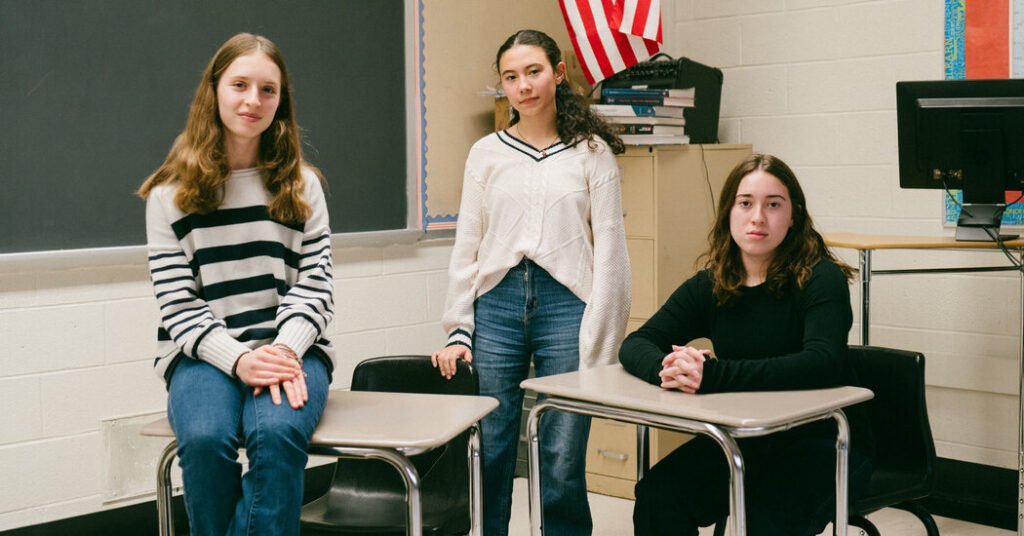It was troublesome late final 12 months for a lot of youngsters to know what to make of the brand new wave of A.I. chatbots.
Academics had been warning college students to not use bots like ChatGPT, which might fabricate human-sounding essays, to cheat on their schoolwork. Some tech billionaires had been selling advances in A.I. as highly effective forces that had been certain to remake society. Different tech titans noticed the identical techniques as highly effective threats poised to destroy humanity.
Faculty districts didn’t assist a lot. Many reactively banned the bots, a minimum of initially, reasonably than develop extra measured approaches to introducing college students to synthetic intelligence.
Now some youngsters are asking their faculties to transcend Silicon Valley’s fears and fantasy narratives and supply broader A.I. studying experiences which are grounded firmly within the current, not in science fiction.
“We have to discover some form of stability between ‘A.I. goes to rule the world’ and ‘A.I. goes to finish the world,’” mentioned Isabella Iturrate, a twelfth grader at River Dell Excessive Faculty in Oradell, N.J., who has inspired her college to help college students who need to study A.I. “However that will probably be inconceivable to seek out with out utilizing A.I. within the classroom and speaking about it at college.”
College students are weighing in at a second when many college districts are solely starting to outline “A.I. training” and think about the way it might match into to present programs like laptop science, social research and statistics. Outdoors influencers have their very own concepts.
Tech giants like Amazon, Microsoft and Google are encouraging faculties to show the A.I. career skills that the industry needs. Some nonprofit teams need faculties to assist college students develop a more critical lens to concentrate on rising applied sciences, together with analyzing A.I. dangers and societal impacts.
At a White House event final week, the Nationwide Science Basis introduced new grants for applications that put together college students for A.I. careers. And the Laptop Science Academics Affiliation, a nonprofit group whose prime donors embody Microsoft and Google, mentioned it could develop training requirements to incorporate A.I. into Okay-12 computing training. Amazon mentioned it was donating $1.5 million to the academics’ group for A.I. training and associated tasks.
Youngsters have their very own concepts about what they need to study A.I. However public faculties not often enable college students to propel curriculum change or form how they need to be taught. That’s what makes the scholar A.I. training marketing campaign at River Dell Excessive so uncommon.
It began final winter when the varsity’s Human Rights Membership, led by Ms. Iturrate and two different college students, determined to analysis A.I. chatbots. The scholars mentioned they had been initially troubled by the concept generative A.I. techniques, that are educated on huge databases of digital texts or pictures, may displace writers, artists and different artistic employees.
Then they discovered extra about constructive use circumstances for A.I. — like predicting mammoth rogue waves or protein folds, which might pace the event of latest medicines. That made the scholars involved their academics could be limiting college students’ publicity to A.I. by focusing solely on chatbot-enabled dishonest.
The membership leaders consulted their adviser, Glen Coleman, a social research instructor who encourages college students to develop their very own factors of view. And so they determined to develop a survey to gauge their schoolmates’ data and curiosity in A.I. chatbots.
River Dell Excessive, which serves about 1,000 college students in an higher center class enclave of Bergen County, just isn’t a typical public college. When the Human Rights Membership proposed to discipline their A.I. survey schoolwide final spring, the principal, Brian Pepe, enthusiastically agreed.
Greater than half of the varsity — 512 ninth by twelfth graders — answered the nameless questionnaire. The outcomes had been shocking.
Solely 18 college students reported utilizing ChatGPT for plagiarism. Even so, the overwhelming majority of scholars mentioned that dishonest was their academics’ predominant focus throughout classroom discussions about A.I. chatbots.
Greater than half of the scholars mentioned they had been curious and enthusiastic about ChatGPT. Many additionally mentioned they wished their college to offer clear tips on utilizing the A.I. instruments and to show college students find out how to use the chatbots to advance their educational abilities.
The scholars who developed the survey had different concepts as properly. They assume faculties must also train college students about A.I. harms.
“A.I. is definitely an enormous human rights challenge as a result of it perpetuates biases,” mentioned Tessa Klein, a tenth grader at River Dell and co-leader of the Human Rights Membership. “We felt the necessity for our college students to find out how these biases are being created by these A.I. techniques and find out how to establish these biases.”
In June, Mr. Pepe had the membership leaders current their findings to the academics. The scholars used the survey information to exhibit their schoolmates’ curiosity in broader alternatives to study and use A.I.
Mr. Pepe mentioned he hoped highschool college students would finally have the ability to take stand-alone programs in synthetic intelligence. For now, he has floated the thought of a extra casual “A.I. Lab” on the college throughout lunch interval the place college students and academics may experiment with A.I. instruments.
“I don’t need A.I. or ChatGPT to turn out to be like this Ping-Pong recreation the place we simply get caught backwards and forwards weighing the positives and negatives,” mentioned Naomi Roth, a twelfth grader who helps lead the Human Rights Membership. “I believe youngsters want to have the ability to critique it and assess it and use it.”

